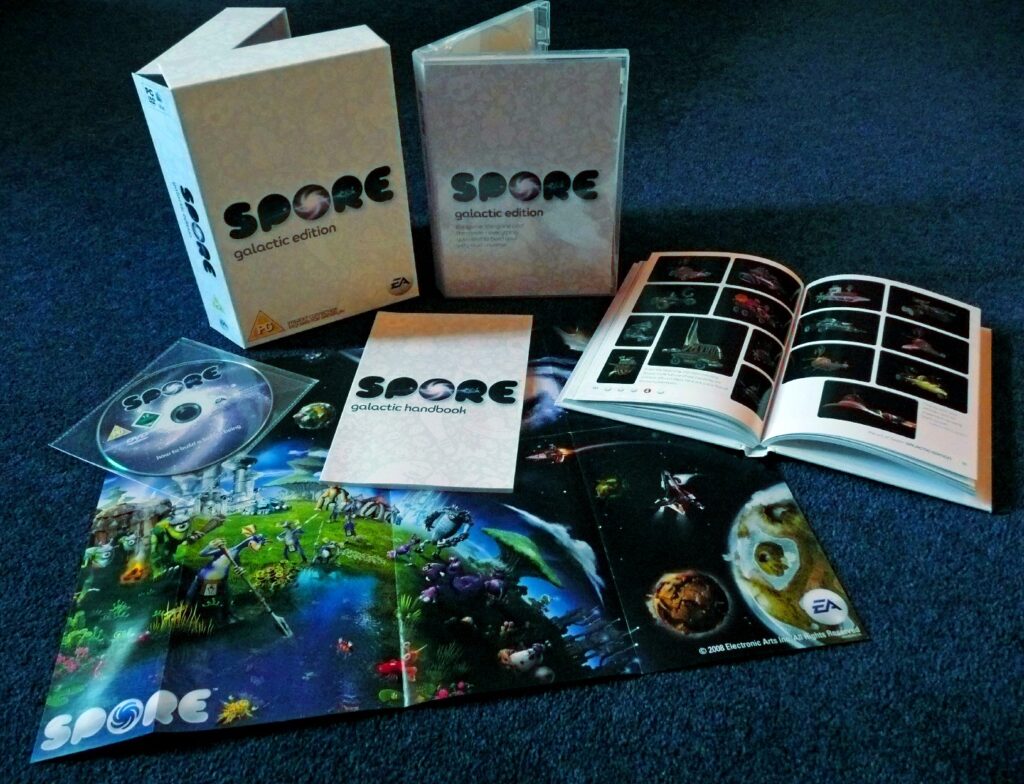I need to get something off my chest. Contrary to popular belief, Spore doesn’t simulate evolution. But it does very effectively model a universe governed by Intelligent Design.
A popular misnomer is that evolution is a ‘creative’ process, in the sense that it is a force that necessarily shapes organisms to be somehow ‘better’ than previous organisms. This was the discredited view held by some Social Darwinists, such as Herbert Spencer, the philosopher who coined the term “survival of the fittest”.
However, that’s not how evolution rolls. In fact, the operative force behind evolution, natural selection, could be seen as more of a destructive force than a creative one. Natural selection works more actively to eliminate ‘unfit’ organisms (or traits, or genes, depending on how you look at it) rather than promoting ‘fit’ ones. Over the long term certain genes do increase in frequency, but the genes themselves were created by random mutations.
Crucial here is your definition of ‘fitness’. It’s easy to think of fitness as being sharper teeth, longer claws etc, as represented in the creature editor. But in fact, fitness is defined by the ability of an organism to breed and pass its genes on to a subsequent generation – tooth and claw might help in this process, but they’re not necessary to define fitness.
So an animal could be the Ultimate Predator on the savannah, but if it doesn’t reproduce, then it’s fitness amounts to nought. Compare that to the Hapless Herbivore that might constantly become food for the ultimate predator, but old Hapless might breed like, well, rabbits and eventually outlive the Ultimate Predator (or it’s genes will) over the generations. In this case it could be said that the organism with the greater fitness was Hapless, regardless of its stunted teeth, poor sense of direction and gift for running straight into the toothy maw of the feisty Ultimate.
So when you’re playing Spore, and you periodically pause to ‘evolve’ your organism, you’re not emulating evolution. But you are nicely emulating the way Intelligent Design works.
And I quote (from the Discovery Institute website):
“The theory of intelligent design holds that certain features of the universe and of living things are best explained by an intelligent cause, not an undirected process such as natural selection.”
And in Spore, that “intelligent cause” is you.

Every time you meddle, it’s the hand of, um, whatever it is the ID crew think is running the show (just between you and me, I think they might actually think it’s God, but it could equally be a player of MetaSpore in another universe) that is shaping the direction of the organism. Not evolution.
In fact, an effective evolution simulator (of which there are many) would have you establish the parameters of the environment and introduce some virtual organisms and let them run their course. As long as they satisfy a few prerequisites – such as reproduction, heredity and the ability to mutate – then we’re talking evolution.
As such, Spore: Evolution Edition would not have you fiddling with the organism, but with the environment. And it probably wouldn’t be all that engaging, to tell you the truth.
That said, as a staunch evolutionist I’m not suggesting we hit the streets, torches and pitchforks in hand, to attend a mass burning of Spore discs. In fact, I think Spore is an excellent game and a powerful tool to teach some aspects of scientific thinking, as are many of Will Wright’s games. But I just want people to stop calling Spore an ‘evolution simulator’. Because every time you do, baby Jesus cries. And that’s a fact.
Other articles:
This guide will help you launch an NFT launchpad
The process involved in creating an NFT launchpad
Use these free and paid ways to promote your NFT launchpad project



